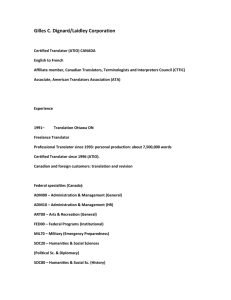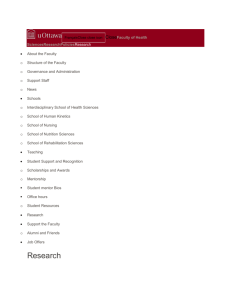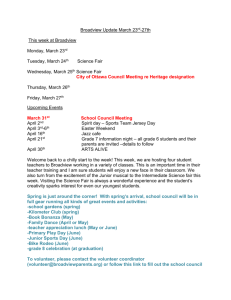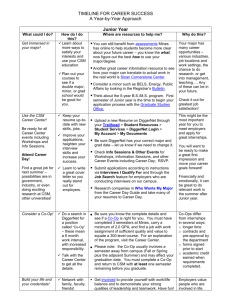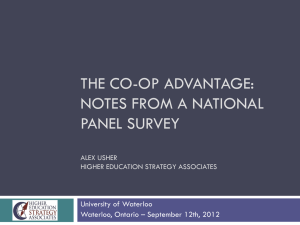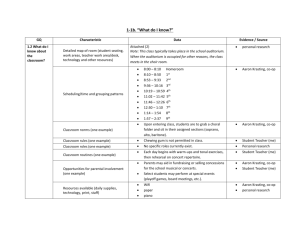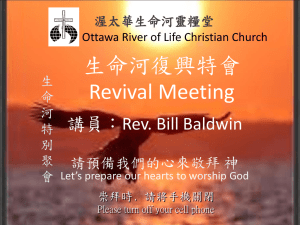Co-op Job Search - uOttawa CO-OP
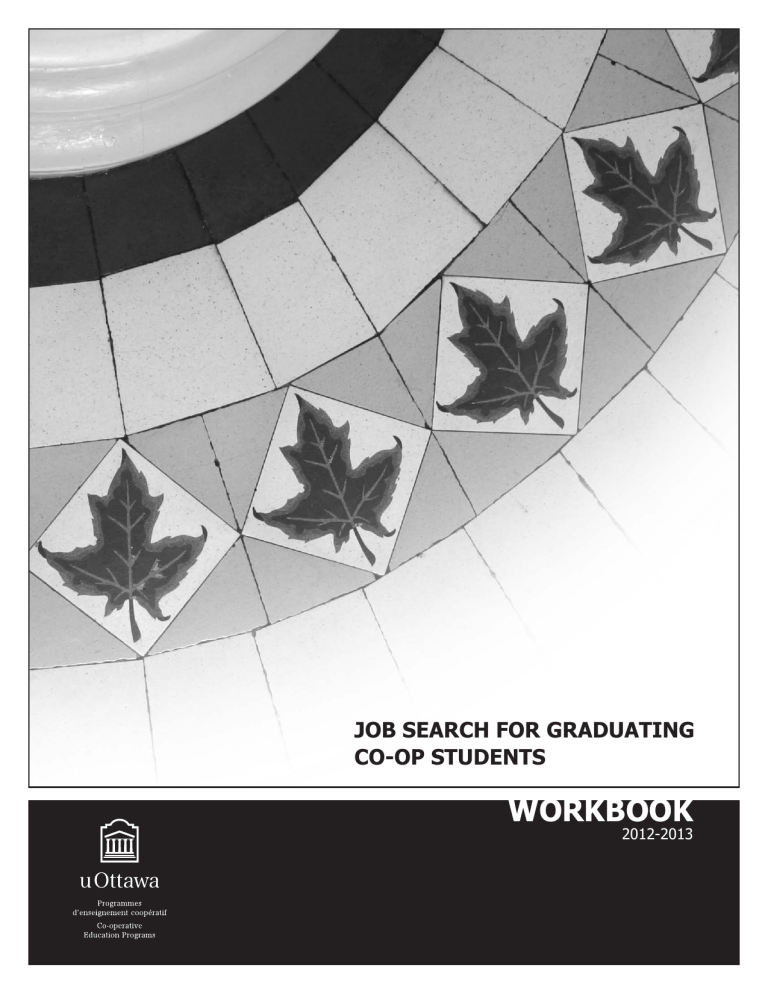
JOB SEARCH FOR GRADUATING
CO-OP STUDENTS workbook
20 12 -201 3
Job search for graduating CO-OP students
2012-2013
Produced by the Co-operative Education Programs of the
University of Ottawa
100 Thomas More, 4 th floor
Ottawa ON K1N 6N5
Telephone: 613.562.5741
E-mail: coop@uOttawa.ca
Website: www.coop.uOttawa.ca
No part of this publication may be reproduced or distributed in any form or by any means, or stored in a database or retrieval system, without the prior written permission of the University of Ottawa.
This guide includes a number of links to various online resources, which were valid at the time of printing. Since links are often modified, we invite our readers to consult our online version for the latest URL updates.
JOB SEARCH
WORKSHOP OUTLINE
INTRODUCTION
……………………………………………………………………………………………………………………………… 2
LOGISTICS
………………………………………………………………………………………………………………………………………… 3
PASSIVE VS. PROACTIVE JOB SEARCH
…………………………………………………………………………… 4
Finding a job in the hidden job market…………………………………………………………………………………………………………… 5
How do employers hire?………………………………………………………………………………………………………………………………… 6
JOB SEARCH ACTIVITIES
Career research resources……………………………………………………………………………………………………………………………… 7
Activity: Career path……………………………………………………………………………………………………………………………………… 8
Job search strategy resources………………………………………………………………………………………………………………………… 9
Activity: Job search script……………………………………………………………………………………………………………………………… 10
Activity: People you know……………………………………………………………………………………………………………………………… 11
Activity: Companies that should know you……………………………………………………………………………………………………… 12
Increasing your net resources………………………………………………………………………………………………………………………… 13
Activity: Increasing your net…………………………………………………………………………………………………………………………… 14
Cover letter…………………………………………………………………………………………………………………………………………………… 15
Activity: Cover letter critique…………………………………………………………………………………………………………………………… 16
Cover letter tips……………………………………………………………………………………………………………………………………………… 17
E-mail cover letter tips…………………………………………………………………………………………………………………………………… 18
Activity: Spot the resumé differences……………………………………………………………………………………………………………… 19
RESOURCES AND TIPS
Resumé tips…………………………………………………………………………………………………………………………………………………… 26
Interview and thank you letter tips…………………………………………………………………………………………………………………… 27
Checklist………………………………………………………………………………………………………………………………………………………… 28
Additional resources………………………………………………………………………………………………………………………………………… 29
University of Ottawa, CO-OP Programs
1
JOB SEARCH
INTRODUCTION
WORKSHOP LEADER
• Professional Development Specialist
WORKSHOP GUIDELINES:
• Arrive on time
• Sign the attendance sheet
• Play an active role
• Respect others
The results you get directly reflect the effort you put in.
NOTES
WHY OFFER THIS WORKSHOP?
• Empower students
• Develop job search skills
• CO-OP mandate: focused on learning
LEARNING OBJECTIVES
• Learn how to conduct an effective job search by:
–
Clearly identifying what you want through a process of reflection and research
–
Knowing how to search and target employers by understanding their needs and their recruitment methods
–
Creating tailored cover letters and resumés
NOTES
Give a man a fish and you feed him for a day. Teach a man to fish and you feed him for a lifetime.
– Chinese Proverb
University of Ottawa, CO-OP Programs
2
JOB SEARCH
LOGISTICS
FINDING A JOB IS A FULL-TIME JOB
What you’ll need to succeed:
• A plan (this guide)
• A proactive attitude
• Flexibility
• Commitment/determination
NOTES
ORGANIZATION
• Get organized:
–
Use this guide as a template for your job search.
–
Use the checklist.
–
Block off certain times during the week to devote to your job search.
–
Keep track of everything you do.
University of Ottawa, CO-OP Programs
3
JOB SEARCH
PASSIVE VS. PROACTIVE JOB SEARCH
responsibilities resumé
OUTDATED JOB SEARCH
Passive job search
Self-centered approach
Primarily focuses on writing and distributing resumés and letters in response to job listings
Develops traditional chronological resumé stressing employment dates and focusing on duties and
Brief cover letter politely repeats the contents of
Major job search activities involve responding to classified ads with a resumé and cover letter
Prepares answers to anticipated interview questions
Waits to hear from employers
Primarily a paper writing and mailing exercise
Job search tends to be spontaneous and serendipitous
Myth-based job search
Little use of Internet beyond checking online job postings and posting resumés online
UPDATED JOB SEARCH
Proactive job search
Employer-centered approach
Focuses on entire job search process with selfassessment and goal-setting playing important foundation roles
Develops performance-oriented resumé stressing accomplishments and including an objective and summary of qualifications
Cover letter expresses personality and includes a follow-up statement
Research, networking and follow-up play critical roles throughout the job search process
Provides preparation for both answering and asking questions during the interview
Uses effective follow-up techniques
Focuses on e-mail, telephone and face-to-face communications
Planning and preparation play key roles throughout the job search
Reality-based job search
Fully integrates the Internet into the job search, with special emphasis on conducting research and networking
From Campus Career Center’s The Job Hunting Guide by Ron and Caryl Krannich, Ph.Ds
University of Ottawa, CO-OP Programs
4
JOB SEARCH
FINDING A JOB IN THE HIDDEN JOB MARKET
The job market is saturated with opportunities. Look in any newspaper or type “jobs” into an online search engine and you’ll be overwhelmed with postings. Unfortunately, applying for these jobs tends to lead to dead ends. Why? When applying for advertised jobs there’s lots of competition and little opportunity for you to stand out from the crowd. The solution is to tap into the hidden job market.
The hidden job market is all around us. The trouble is it’s not immediately apparent. In the hidden job market, jobs are not listed in the newspaper or posted online, they can’t be found at career services or by going to placement agencies. So how do you find them? They are found by connecting with people.
Connecting with people in order to find a job takes planning and strategy. An effective strategy involves five key steps: (1) developing a job search strategy script, (2) connecting with friends, relatives and secondary contacts, (3) communicating directly with employers, (4) connecting with people through professional associations, personal activities and volunteerism, and finally (5) tracking your search activity so that you remain strategic and organized.
Career
Services
11%
Other
9%
Employment agencies
3%
Newspaper
& Internet
14%
Applied directly to employer
35%
Friends, relatives & secondary contacts list
28%
University of Ottawa, CO-OP Programs
5
JOB SEARCH
HOW DO EMPLOYERS HIRE?
Hidden job market
Roughly 80% of positions available at any point in time are not advertised.
WHY?
• Advertising is not the most cost-effective strategy for recruiting qualified candidates.
• Candidates who are referred represent less risk.
• Employers prefer active job seekers as opposed to passive ones.
• Employers may not have the time to fill the position.
COMMON RECRUITMENT METHODS
a) Internal
• Vacancies occur through promotions, maternity leaves, temporary assignments, normal attrition (retirements and regular turnover).
• Networking: referrals by employees, word of mouth.
• Non-permanent staff (i.e. on contract, summer and part-time staff or volunteers).
• Posting ads on their intranet site or on bulletin boards (may consider external applications if no one is qualified internally).
b) External
• Unsolicited applications.
• Networking with family, friends and acquaintances.
• Networking through professional associations and posting ads on their Web site.
• Advertising on the organization’s Web site.
• Attending career and job fairs.
• Special recruitment programs (new grads from post-secondary institutions, CO-OPs and internships, summer employment programs, diversity programs).
• Using a third party recruiter (temporary employment agencies, headhunters).
• Advertising in newspapers, job search Web sites, radio and TV ads (20% of jobs available).
EXCEPTION: Positions that have a high turnover rate (sales, clerical) require skills that are in short supply or require extensive experience have better chances of being advertised.
NOTE: Remember that some positions are advertised but have already been filled unofficially.
University of Ottawa, CO-OP Programs
6
JOB SEARCH
CAREER RESEARCH RESOURCES
Career development is a life-long process of exploring and gathering information. This enables you to synthesize, gain competence, make decisions, set goals and take action. The key to success is: a.
Knowing who you are and what you have to offer (self-assessment) b.
Identifying what you want (researching careers and occupations) c.
Creating an action plan (course selection, developing required skills, gaining experience) d.
Conducting an effective job search
Research careers/occupations
• “What can I do with my studies?”: www.careers.uOttawa.ca/en/students/studies
• Information on the Canadian labour market: www.labourmarketinformation.ca
• Canada Job Futures: http://jobfutures.ca/en/home.shtml
• Explore occupations, industries/sectors and labour trends: http://workinfonet.ca/
• National Occupational Classification: http://www23.hrdc-drhc.gc.ca/2001/e/generic/welcome.shtml
Research by geographic location
• www.ottawaregion.com/sitemap.asp
• For other cities, try googling the city name with keywords such as example: “Toronto Labour Market”)
• Many job search Web sites can be searched by city
Labour Market Key Industry or Economic Development (for
Industry/sector Web sites
• www.councils.org (click on List of councils for links to national and provincial sectors)
• Try a keyword search using the following example: “Manufacturing Industry Canada”
Employer guides and career magazines (available at Career Services)
• The Canada Student Employment Guide
• The Career Directory
• Who’s Hiring
• Trade Directories (ex. Canadian Manufacturing – Ontario)
• Job Postings Magazine
• Career Options in Business, Arts and Sciences
• Career Options in Hi-tech and Engineering, etc.
Professional associations
• The Directory of Associations in Canada (available at Career Services)
• Consult “What can I do with my studies?” which lists professional associations by program: www.careers.uOttawa.ca/en/students/studies/ www.cicic.ca/profess-en.php
Job search Web sites
• Search by geographical location, industry or job type.
• Some sites contain links to employers (by alphabetical name).
http://company.monster.ca/ http://www.workopolis.com/content/resource/research.html (search in the FastTrack section)
Career and job fairs
• Employers who recruit graduating students from the University of Ottawa often have summer employment and/or CO-OP opportunities. Consult the following Web site for more information: www.careers.uOttawa.ca (click on Career Fairs) and attend these events.
• Other career and job fairs (advertised through newspapers, radio and TV ads and magazines).
• Attend a great number of networking events organized by your faculty or the University. In addition to career fairs, student associations and faculties are organizing all kinds of events, such as luncheon meetings and conferences, cocktail parties, launches, etc. These will be ideal opportunities to increase your networking.
University of Ottawa, CO-OP Programs
7
JOB SEARCH
ACTIVITY: CAREER PATH
Purpose:
To identify the kind of work you seek as clearly as possible.
Rationale:
Taking the time to reflect on your career goals will allow you to be focused in your job search and maximize your efforts.
Activity:
1.
Complete all sections below.
2.
Be ready to share and discuss with the group.
CAREERS/OCCUPATIONS
List all the job titles or careers in which you are interested. If you are unsure about job titles, list the kind of work you would like (e.g. tasks or job duties).
GEOGRAPHIC LOCATION
List all the cities or areas where you are willing to work.
SECTORS
Circle the industry sectors that interest you.
Government sector
- Federal
- Provincial
- Municipal
Para-public sector
- Universities and colleges
- School boards
- Hospitals & emergency services
- Crown corporations & agencies
- Public utilities
Private sector for profit
- Corporations
- Companies
Private sector non-profit
- NGOs
- Charities
- Foundations
- Institutes
- Associations
University of Ottawa, CO-OP Programs
8
JOB SEARCH
JOB SEARCH STRATEGY RESOURCES
You must be able to clearly articulate why an employer should hire you. This will be easier if you are able to demonstrate:
• What you have to offer (your skills and experience)
• That you understand their needs (discovered through research and information interviewing) and have a genuine interest in their organization
Approaching employers
• The common and unsuccessful approach “What’s in it for me?”
– Avoid “I’m looking for a job” and “Do you hire graduates?”
• The effective approach: “What’s in it for the employer?”
– Be a “detective” (ask questions, gather information).
– Learn about their challenges and needs and you may identify hidden opportunities.
– Then, propose your candidacy based on what you have learned.
– Be ready to answer the following questions: What do you have to offer? Why should they hire you?
Employer-centered approach questions
• What are the challenges you (or your organization) are currently facing? Does this impact your staffing needs?
• How does your organization usually fill positions? Are there ever any positions that are not filled this way?
• While researching your Web site, I noticed that you have a Human Resources department. Is the recruitment process centralized or decentralized? How involved are managers in the process?
• Which positions have a high turnover rate? Why?
• Which positions are harder to fill? Why?
• Are there any projects that you simply don’t have the time to do?
• Are you interested in someone with xyz skills/experience?
• Can you give me an overview of how the work in your department flows? For instance, are there peak periods and down times?
University of Ottawa, CO-OP Programs
9
JOB SEARCH
ACTIVITY: JOB SEARCH STRATEGY SCRIPT
Purpose:
To quickly and clearly articulate your past, present and future.
Rationale:
Being able to describe who you are and why you are speaking with someone opens up opportunities for jobs.
Activity:
Part 1 – Individually
• Fill out the job search strategy script outline.
Part 2 – In groups of three
• Say your script aloud.
• Give feedback on each individual’s script.
• Modify your own script as required.
Part 3 – As a larger group
• Be prepared to discuss the question: “What are some of the problems and challenges with using a job search strategy script?”
Part 4 – On your own time
• Use the Job Search Strategy Script with your friends, relatives and secondary contacts, when applying directly to companies and with the people you meet through professional associations, personal activities and volunteerism.
Current education – 10 seconds or less
Relevant past work experience – 10 seconds or less
Three strengths – 10 seconds or less
I’m focusing my career search on… – 15 seconds or less
The reason I am speaking with you is I’m looking for ideas, advice and/or information on… – 10 seconds or less
Note: Notice that you are not asking for a job. The direct request is not as effective as the open question: “Do you have any ideas/advice/information?”
University of Ottawa, CO-OP Programs
10
JOB SEARCH
ACTIVITY: PEOPLE YOU KNOW
Purpose:
To generate a list of people you know. These are your primary contacts.
Rationale:
We often overlook the people closest to us when job searching.
Activity:
Part 1 – Individually
• List two to three people you know.
• List their contact details.
• Note the date/time when you will contact them.
Part 2 – On your own time
• Brainstorm an extensive list of people you know. Do not edit yourself. Write a list that includes everyone you know from your dog sitter to your mom’s best friend!
• Note the contact details and set a date to connect with each person.
• Contact everyone on your list and use the Job Search Strategy Script to gather information, ideas and advice.
• Follow through with the next steps as suggested by your primary contacts.
Date Name Contact details
Ideas, information or advice provided
Next steps
University of Ottawa, CO-OP Programs
11
JOB SEARCH
ACTIVITY: COMPANIES THAT SHOULD KNOW YOU
Purpose:
To generate a list of employers that would be interested in your skills.
Rationale:
When connecting directly with employers you eliminate competition and increase your chances of securing a job.
Activity:
Part 1 – Individually
• List two to three companies you know you would like to work for.
• If possible at this stage, write down contact details.
• Write down why you are interested in working there.
• Note the date/time when you will contact them directly.
Part 2 – On your own time
• Research companies that would be interested in your skills and abilities. Read the newspaper, check the Internet, go to Career Services (www.sass.uOttawa.ca) and speak with friends, relatives and contacts to create a list of companies.
• Refine the list to a total of 25 companies. Select this final list of 25 companies based on their location, your skill match, your values or whatever criteria are important to you.
• Call each company. Use your Job Search Strategy Script.
• Follow up with the next steps.
Date Company Contact details
Why you’re interested in working there
Next steps
University of Ottawa, CO-OP Programs
12
JOB SEARCH
INCREASING YOUR NET RESOURCES
Here are a few additional ways of finding employers who may have a need for someone with your skills set. A proactive and creative approach will set you apart from your competition.
Networking
• Networking is the act of communicating with people in order to exchange information. It can be done in person, by telephone or by e-mail with people you know and even strangers.
• It’s one of the most effective job search strategies; although it can take more time to land a job than through some other strategies. However, the advantage is that you’ll likely locate opportunities that would never have been advertised through other methods.
Creative job searching methods
• Attend on- and off-campus conferences, presentations or seminars and network.
• Sign up for free company or industry newsletters (print and online).
• Read industry publications (i.e. Ottawa Tech Industry Guide) that often have articles on companies that are growing and even advertise positions.
• Volunteer for an organization, a campus club, a cause or a professor.
• Focus a class project on an organization and interview key people there.
• Join a professional association as a student member (conferences, mentorship programs, job postings, create or lead a student chapter).
• Get involved in special events (i.e. undergrad business games, fundraising events sponsored by organizations, etc.).
• Attend social events and network.
• Find contact names by reading articles in newspapers, publications or on the Internet. Then conduct an information interview to enlarge your network.
What’s an information interview?
• A meeting where you gather career information from a contact currently working in the field or company you are interested in joining.
• The goal of this meeting is not to ask if there are positions available but instead to learn about the organization, industry trends, career paths and required skills or experience.
• Conduct information interviews with people you have identified through your research.
Who else can I network with?
• Friends and family
• Colleagues and supervisors (current and former)
• Classmates and professors
• Members of professional associations, student clubs, business chambers
• Members of social groups, community clubs, sports activities
• Family doctor, dentist, hairdresser, pharmacist, etc.
University of Ottawa, CO-OP Programs
13
JOB SEARCH
ACTIVITY: INCREASING YOUR NET
Purpose:
To create a larger group of people that you can connect with.
Rationale:
By increasing the amount of people you know, you increase your access to the hidden job market.
Activity:
Part 1 – Individually
• List one field-related organization or association that you are aware of.
• List one organization, association, group or team that relates to your interests.
• List one organization, association or group that would be interested in your volunteer services.
Note: Whenever possible choose groups that attract working professionals. While student groups are important when job searching, it is to your advantage to connect with employed people.
Part 2 – On your own time
• Research possible places to network with professional, personal and quasi-professional groups. Note: Many ideas can be gathered when using your Job Search Strategy Script with friends, relatives, secondary contacts and employers.
• Join the groups that best match your interests and skills.
• Attend events and meetings. Get involved.
• Use your Job Search Strategy Script with the people you meet.
Professional
Organizations or associations that relate to your education and/or career goals. For example, IEEE.
Personal
Organizations, associations, groups or teams that relate to your interests. For example, The Running Room.
Quasi-professional
Organizations, associations or groups that would be interested in your volunteer services. For example, the Canadian
Cancer Society.
University of Ottawa, CO-OP Programs
14
JOB SEARCH
COVER LETTER
Why?
The cover letter demonstrates to the employer that you have read the posting carefully and that you are truly interested in that particular job. Resumés need to be accompanied by cover letters when this is specified in the CO-
OP process, and cover letters should always accompany a resumé in a professional job search. Many employers will not even look at an application that does not come with a cover letter.
Tips:
• Make the letter concise and to the point; clearly link your experience and the posting requirements.
• Maximum length: one page, with 3-4 paragraphs.
• Should pique the employer’s interest; encourage the employer to read your resumé.
• Avoid repeating information already in your resumé.
• Tailor your letter to the posting; do not use generic letters.
For a great cover letter:
• Address it to a specific person. Search the Web or call the company to find out who to address your letter to.
• Get an inside contact.
• Only include relevant information and be brief.
• Make sure you clearly specify the job posting, the job number and why you would be the ideal candidate.
• Review and correct your letter; avoid mistakes of grammar, spelling and structure.
GOOD LUCK!
University of Ottawa, CO-OP Programs
15
JOB SEARCH
ACTIVITY: COVER LETTER CRITIQUE
Purpose:
To understand what makes for an effective cover letter.
Rationale:
By developing your cover-letter writing skills, you will increase your marketability.
Activity:
Part 1 – Individually
•
Read and edit the cover letter below.
Part 2 – As a group
•
Be prepared to share your suggestions on how to improve the cover letter.
Dear Sir/Madam:
The health and well-being of our environment is a growing concern in our society and is becoming increasingly important to Canadians. This means that the Environmental Protection Service plays a key role in preventing and preparing for environmental emergencies. As such, the Environmental Protection Service is a section of Environment
Canada that I would very much like to be involved in.
Being an Environmental Science graduate from the University of Ottawa, I have already obtained a wealth of knowledge and skills that I believe would be an asset to your work environment. During my work terms, I have learned to effectively use ArcGIS to display geospatial data. I have written and created reports and presentations in many different fields such as ecosystem biology, ecology, inorganic chemistry and environmental geology.
Organization, dedication and strong communication skills are characteristics I strive for in my life. I would be more than happy to display these qualities for the Environmental Protection Service division of Environment Canada.
Thank you for your consideration. I certainly look forward to exploring this further.
Kind regards,
Karen Leblanc
University of Ottawa, CO-OP Programs
16
JOB SEARCH
COVER LETTER TIPS
Tailor your letter to the organization by addressing their needs. Use the information you’ve gathered through research and information interviews or directly from the job description.
Your street address
City, province, postal code
Telephone number
Date
Mr./Ms./Dr. Name
Title
Company name
Complete address
Dear Mr./Ms./Dr. Name:
Opening paragraph: State why you’re writing (job, summer job) and how you learned of the organization or position (Internet, newspaper, contact, etc.). Be sure to mention the name of the position(s) if you saw a specific ad, as many organizations hire for many different positions.
Second paragraph: Explain why you’re interested in the employer or type of work the employer does (simply stating that you’re interested does not explain why, and it can sound like a generic letter that you’re sending off to everyone – not very effective). Demonstrate that you know enough about the employer or position to relate your background to the employer or position (check their Web site and mention that you did so in your letter). Mention specific qualifications that make you a good fit for the employer’s needs (check the job description for clues). Seize the opportunity to go into details about relevant items in your resumé and say that your resumé is enclosed. Mention any other enclosure that is required to apply for the position.
Third paragraph: Indicate that you would like an opportunity to be interviewed for a position or to discuss the employer’s opportunities or hiring plans. State what you will do to follow up, such as call the employer within two weeks. If you plan to be in the employer’s area soon, offer to schedule a visit and indicate when you would be available. State that you would be glad to provide the employer with any additional information needed. Thank the employer for her/his consideration.
Sincerely,
(Your handwritten signature)
Enclosure(s) (refers to resumé, etc.)
University of Ottawa, CO-OP Programs
17
JOB SEARCH
E-MAIL COVER LETTER TIPS
If you are sending your cover letter by e-mail, you would start at the salutation (i.e. “Dear …”). Don’t forget to add something in the subject line such as the title of the position; otherwise, if you leave it blank, some organizations have filters that will consider your e-mail to be junk mail.
Also, don’t forget to check if their e-mail accepts attachments (otherwise, you may have to copy paste your resumé directly after your cover letter in the e-mail).
2-545 University Avenue
Ottawa ON K1N 6N5
613 564-5400 ext. 654
September 6, 2005 Mr. Paul Zeng
Senior Engineer
Innovative Corporation
1221 Billbury Street
Ottawa ON K1J 0N2
Dear Mr. Zeng:
When I read the engineering position listed on your Web site, I felt it was a great match with my education, skills and work experience. Attached, please find a copy of my resumé for your consideration.
The chemical engineering program at the University of Ottawa, combined with my work terms, has given me the technical skills and practical knowledge to become a contributing member of your organization. As you will see from the attached resumé, I had the opportunity of working at the CANMET Energy Technology Centre of Natural Resources Canada, where I acquired knowledge and experience of the operation of a downdraft gasification unit.
What motivated me to apply to Innovative Corporation is your reputation as a leader in the plastics manufacturing field and your team-based approach to problem-solving. Furthermore, I am excited at the prospect of using your state-of-the-art technology and joining an organization that values and empowers its employees through continuous learning.
I would be happy to discuss my qualifications with you in an interview. In the meantime, I wish Innovative Corporation continued success in the future.
John Doe (signature)
Enclosure: resumé
Never address a letter “To whom it may concern” or
“Dear Sir or Madam”. It’s treated in the same manner as junk mail (deleted).
This is where you can tailor each letter to the employer’s needs by researching the organization to demonstrate knowledge and interest.
University of Ottawa, CO-OP Programs
18
JOB SEARCH
ACTIVITY: SPOT THE RESUMÉ DIFFERENCES
Purpose:
To identify the differences between a CO-OP resumé and a professional resumé.
Rationale:
By identifying the differences, you will be able to transform your resumé into a professional resumé as needed: for finding your own job or as a new grad.
Activity:
Part 1 – Individually
• Find and circle the differences between the resumés.
Part 2 – As a group
• Be prepared to share and discuss your findings with the group.
CO-OP resumé
Susan Wright
EDUCATION
2002 -
Present
Baccalaureate in Social Sciences, Honours Political Science (CO-OP)
Concentration Criminology
University of Ottawa, Ontario
• Presently in fourth year
1997 - Ontario Secondary School Diploma
2002
SKILLS
Leadership
• Charity fundraising coordinator and rower for Food Safety Quality
Directorate dragon boat team.
• Volunteered for the grand opening of the House of Compassion, a centre fo homeless aboriginals.
• Volunteered in West Africa, Senegal, in a primary school and in an orphanage.
• Volunteered in the 2005 "Ottawa Regional Cancer Centre Foundation"
Telethon as an usher.
• Volleyball team captain with OSSC.
• Organized community-awareness events, such as Christmas Hampers,
MADD (Mothers Against Drunk Driving) workshop, and Heart and Stroke
Foundation fundraising.
University of Ottawa, CO-OP Programs
19
JOB SEARCH
Computer
Microsoft Office
• Used MS Word, Excel, and PowerPoint to create several essays, projects, and presentations at the university level and MS Outlook to communicate by e-mail at work.
Internet
• Researched on the Web for work-related tasks and projects, while using my abilities with the Internet.
Greenbutton
• Developed skills in Web page design and online discussion groups as an administrator and moderator.
Communication
• Certified following a media communications and journalism course.
• Strong communication skills in English and French (written and spoken).
• Performed many oral presentations for work and school.
WORK EXPERIENCE
May -
August 2006
Moderator
Foreign Affairs Canada, Ottawa, Ontario
• Selected to attend a prestigious round table on Canada and North
American relations in Montreal.
• Developed skills in Web page design and online discussion groups as an administrator and moderator.
• Undertook research related to the International Policy Statement on a range of topics such as failed and fragile states, demography and geopolitics. Tasks included research, drafting of correspondence, briefs and memos and participation in the preparation of research documents.
• Acquired strong organizational skills, interpersonal skills and the ability to multi-task.
• Selected to give several presentations for the division in both official languages.
• Demonstrated the ability to produce work on a tight schedule.
September 2005 - Junior Policy Analyst
April 2006 Public Safety and Emergency Preparedness Canada (PSEPC)
• CO-OP term extended to part-time employment.
• Accomplished the exclusive “How Ottawa Works” workshop at the
Canadian School of Public Service.
• Selected to attend quarterly meetings in Thunder Bay and Winnipeg to gain knowledge and experience of policy negotiations and development with Aboriginal people.
• Developed extensive methodology and research skills by conducting research projects on correction policies for Aboriginal people.
• Examined the development of government policies, the role of a senior analyst working in a central agency, the government philosophy concerning horizontal policy development, by accomplishing reports,
University of Ottawa, CO-OP Programs
20
JOB SEARCH
• Developed skills in Web page design by creating part of the ACPU Web page.
January -
April 2005
Tour Guide/Interpreter
Parliament of Canada
• Selected to give the VIP tours.
• Demonstrated excellent interpersonal skills as representative of the
Canadian government during tours.
• Gained profound knowledge on parliamentary process and procedures as well as in Canadian history.
• Adapted, with creativity, different presentation skills for various types of groups.
• Gained great time and priority management by completing tours in the allotted time (40 minutes) to be able to start the next tour on time.
• Offered tours in both official languages (English and French).
May -
August 2004
ADDITIONAL INFORMATION
Certificates
•
Member of the Native Alliance of Québec.
• Certified for first aid with St-John's Ambulance.
• Certified with the Health and Safety Program of Ontario (OSSA).
REFERENCES
Tom Mitchell
Deputy Director
Foreign Affairs Canada
613 123-4567
Tom@international.gc.ca
Supervisor
Volunteer
Horizon Cosmopolite, Senegal
• Developed outstanding planning and organizational skills while preparing and presenting lessons in a primary school.
• Acquired knowledge on the organization and management of a humanitarian association.
• Obtained the capacity to adapt easily in a different environment while living with a host family and experiencing water and electricity shortage.
• Demonstrated maturity and autonomy by completing this work term abroad.
• Used creativity and initiative to teach without proper education material.
André Paul
Coordinator of International Programs in Africa
Horizon Cosmopolite, Montreal
1-866-123-4567
Kim Taylor
Sr. Policy Analyst
Public Safety and Emergency Preparedness Canada
(PSEPC)
613 123-4567
Kim@psepc.gc.ca
Person responsible for my work term at Public
Safety and Emergency Preparedness Canada
(PSEPC)
Michel Potvin
Program Manager of Parliamentary Tours
Parliament of Canada
613 123-4567
University of Ottawa, CO-OP Programs
21
JOB SEARCH
Professional resumé
123, Any Road
Ottawa, Ontario K1L 1A2
CAREER OBJECTIVE
SUSAN WRIGHT
613 123-4567 swright@hotmail.com
Obtain a position in political science, combining my writing experience and knowledge of government policy analysis.
PROFILE
• Bachelor’s Degree in Political Science with a concentration in Criminology.
• Experienced in many different federal government departments.
• Able to conduct research and analysis of documents pertaining to international and government politics.
• Knowledgeable of current software such as Microsoft Office, Internet and Web page creation.
• Excellent ability to communicate orally and in writing in both official languages.
• Secret Security Clearance (Level II).
EDUCATION
Baccalaureate in Social Sciences, Honours Political Science (CO-OP)
Concentration Criminology
University of Ottawa, Ontario
2006
WORK EXPERIENCE
Moderator May-August 2006
Foreign Affairs Canada, Ottawa, Ontario
• Selected to attend a prestigious roundtable on Canada and North American relations in Montreal.
• Developed skills in Web page design and online discussion groups as an administrator and moderator.
• Undertook research related to the International Policy Statement on a range of topics such as failed and fragile states, demography and geopolitics. Tasks included research, drafting of correspondence, briefs and memos and participation in the preparation of research documents.
• Acquired strong organizational skills, interpersonal skills and the ability to multi-task.
• Selected to give several presentations for the division in both official languages.
• Demonstrated the ability to produce work on a tight schedule.
University of Ottawa, CO-OP Programs
22
JOB SEARCH
Susan Wright 613 123-4567 swright@hotmail.com
Junior Policy Analyst September 2005-April 2006
Public Safety and Emergency Preparedness Canada, Ottawa, Ontario
• CO-OP term extended to part-time employment.
• Accomplished the exclusive “How Ottawa Works” workshop at the Canadian School of Public Service.
• Selected to attend quarterly meetings in Thunder Bay and Winnipeg to gain knowledge and experience of policy negotiations and development with Aboriginal people.
• Developed extensive methodology and research skills by conducting research projects on correction policies for Aboriginal people.
• Examined the development of government policies, the role of a senior analyst working in a central agency, the government philosophy concerning horizontal policy development, by accomplishing reports, memorandum of recommendation, ministerial correspondence and research projects.
• Developed an understanding of Aboriginal culture, community corrections programs and capacity building.
• Developed skills in Web page design by creating part of the ACPU Web page.
Tour Guide/Interpreter January-April 2005
Parliament of Canada, Ottawa, Ontario
• Selected to give the VIP tours.
• Demonstrated excellent interpersonal skills as representative of the Canadian government during tours.
• Gained profound knowledge on parliamentary process and procedures as well as in
Canadian history.
• Adapted, with creativity, different presentation skills for various types of groups.
• Gained great time and priority management by completing tours in the allotted time
(40 minutes) to be able to start the next tour on time.
• Offered tours in both official languages (English and French).
Volunteer May-August 2004
Horizon Cosmopolite, Senegal
• Developed outstanding planning and organizational skills while preparing and presenting lessons in a primary school.
• Acquired knowledge on the organization and management of a humanitarian association.
• Obtained the capacity to adapt easily in a different environment while living with a host family and experiencing water and electricity shortage.
• Demonstrated maturity and autonomy by completing this work term abroad.
• Used creativity and initiative to teach without proper education material.
University of Ottawa, CO-OP Programs
23
JOB SEARCH
Susan Wright 613 123-4567 swright@hotmail.com
COMMUNITY INVOLVEMENT
• Volunteered for the grand opening of the House of Compassion , a centre for homeless aboriginals.
• Volunteered for the Ottawa Regional Cancer Centre Foundation telethon.
• Organized community-awareness events, such as Christmas Hampers, MADD
(Mothers Against Drunk Driving) workshops.
• Fundraised for the Heart and Stroke Foundation .
REFERENCES
Available upon request
University of Ottawa, CO-OP Programs
24
JOB SEARCH
SUSAN WRIGHT
123, Any Road
Ottawa, Ontario K1L 1A2
REFERENCES
Tom Mitchell
Deputy Director
Foreign Affairs Canada
613 123-4567
Tom@international.gc.ca
Kim Taylor
Sr. Policy Analyst
Public Safety and Emergency Preparedness
Canada
613 123-4567
Michel Potvin
Program Manager of Parliamentary Tours
Parliament of Canada
613 123-4567
André Paul
Coordinator of International Programs in Africa
Horizon Cosmopolite, Montreal
1-866-123-4567 andrepaul@horizoncosmopolite.com
613 123-4567 swright@hotmail.com
University of Ottawa, CO-OP Programs
25
JOB SEARCH
RESUMÉ TIPS
• Use your CO-OP resumé (content) to create a 2-page document in Word or WordPerfect.
• You can’t copy your resumé into Word (lose formatting).
Resumé differences
• Don’t forget to add your full contact information (address, phone, e-mail) at the top of your resumé.
• Career objective (optional – between your contact info and your skills section).
This section is not available in a CO-OP resumé. If you choose to use this, make it as specific as possible (i.e. the job title of the position you are applying for including any reference numbers listed on the job description). If there is no position listed, tell them what kind of work you’re targeting.
Here are a few examples:
A public relations position focused on developing and implementing programs, organizing people and events, and communicating positive ideas and images. Effective in public speaking and in managing publicity/promotional campaigns.
A position as a General Sales Representative with a pharmaceutical company that will use my chemistry background and abilities to work on a self-directed basis in managing a marketing territory.
A position in banking where skills in sales, accounts management and customer relations will result in a high retention rate of current clients and a rapid increase in new customers.
Entry-level position in investment research and analysis. Interests and skills include securities analysis, financial planning and portfolio management. Long-range goal: Chartered Financial Planner.
• Ending your resumé: References available upon request. It is assumed that you will provide references if they are requested, so this line is optional. References should be typed on a separate page and brought with you to the interview. Provide them only if they are requested.
University of Ottawa, CO-OP Programs
26
JOB SEARCH
INTERVIEW AND THANK YOU LETTER TIPS
NOTES
INTERVIEWS – DIFFERENCES WITH
CO-OP
• Everything you have learned about interviews will be useful.
• The ending is different if you want the job.
Follow this process after asking your questions:
–
Reiterate interest in the position.
–
What is the next step in the recruitment process?
–
If I haven’t heard from you in xyz days, may
I follow up with you?
–
May I have your business card?
Once you have a business card in hand (or have their contact information), write a thank you note and send it within 48 hours. It is very effective because:
• It demonstrates your business etiquette.
• It may be used as a deciding factor when there are equally qualified candidates.
• Very few people follow up this way.
Mr. John Appleby
Investment Director
Pendulum Investments
910 Banking Corner, Suite 12
Toronto, Ontario M3P 5L2
Dear Mr. Appleby:
Sample thank you letter
Thank you for taking the time to discuss the insurance broker position at Pendulum Investments with me.
After our meeting, it was clear to me that my background and skills coincide well with your needs and the culture of your organization.
I really appreciate that you took so much time to acquaint me with the company. It is no wonder that
Pendulum Investments retains its employees for so long. I feel I could learn a great deal from you and would certainly enjoy working with you.
In addition to my qualifications and experience, I will bring excellent work habits and judgment to this position. With the countless demands on your time, I’m sure that you need people who can be trusted to carry out their responsibilities with minimal supervision.
I look forward to hearing from you concerning your hiring decision. Again, thank you for your time and consideration.
Sincerely,
John Oakley johnoakley@hotmail.ca
University of Ottawa, CO-OP Programs
27
JOB SEARCH
CHECKLIST
Create a professional resumé in Word, WordPerfect, PDF or text format
Establish a list of employers according to selection criteria (type of employer, size, industrial sector, location, etc.)
Establish a list of contacts: family, friends, colleagues; discuss job search and get leads
Book a meeting, if necessary, with a counsellor from Career Services, Civil Law Professional Development Centre or
Telfer School of Management at the University of Ottawa
Create a cover letter, carefully adapting it to each job you apply for
Create a job search scenario
Attend networking functions: professional associations, job fairs, etc.
Participate in a mock interview
Send cold e-mails and make cold calls to potential employers or referrals, requesting information meetings, and use your job search strategy script
Send resumé and cover letter by e-mail, mail or fax to potential employers, contacts, etc.
Follow up on all your applications (by phone/e-mail) within one week
Participate in information meetings and interviews
Send thank-you letters within 24 hours
GOOD LUCK!
University of Ottawa, CO-OP Programs
28
JOB SEARCH
CONCLUSION
ADDITIONAL RESOURCES
Human Resources Centre of Canada for Students
(L’Esplanade Laurier, 300 Laurier Avenue)
Counselling and Personal Development Service
100 Marie Curie, 4 th floor
613.562.5200
www.sass.uOttawa.ca/en/personal
Career Centre, Telfer School of Management
VNR 138 (main entrance lobby)
613.562.5656
www3.management.uOttawa.ca/careercentre
Civil Law Professional Development Centre
FTX 218
613.562.5800 ext. 3251 www.droitcivil.uOttawa.ca and click on
“Développement professionnel”
Career Services
UCU 312
613.562.5806
www.careers.uOttawa.ca
NOTES
University of Ottawa, CO-OP Programs
29
